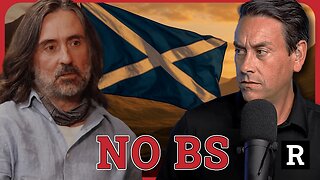Premium Only Content

Descartes and Empiricism (Intro to Philosophy Part 4)
The transition from the pre-modern era to the modern era began to take shape through the thinking of René Descartes (1596-1650) and his philosophy of rationalism and empiricism. Because of the uncertainty present in the attitudes of the culture of his day, Descartes set out in search of absolute certainty for his beliefs. To build a system to achieve absolute certainty, Descartes needed to find a foundation to build on: an idea that couldn’t be doubted. Cogito ergo sum: I think, therefore, I am. Descartes concluded that you cannot doubt your own existence because if you’re doubting, you must be thinking, and thus you must exist. Based on this foundation, Descartes said we could be skeptical of everything else and only believe those things we can prove with absolute certainty. Eventually in Western culture, Empiricism became the method to accomplish this, by using the data from our physical senses. These ideas subsequently influenced philosophers and scientists such as Francis Bacon, Thomas Hobbes, John Locke, and Isaac Newton.
Click here https://linktr.ee/convincingproof/ for articles, podcasts, and other resources from Convincing Proof that give good reasons and evidence to believe that Christianity is true. You can find resources on apologetics, theology, philosophy, ethics, and more.
You can order a copy of my book, "Divine Love Theory: How the Trinity is the Source and Foundation of Morality," from Amazon here: https://www.amazon.com/Divine-Love-Theory-Foundation-Morality/dp/0825447577/.
Like Jesus and His disciples (Luke 8:3), my missionary work with Convincing Proof is funded by a large team of people, most of whom are investing a small amount on a monthly basis. If God leads you to invest in my work, you can donate to Convincing Proof Ministries by visiting this link: https://convincingproof.org/donate/. Your support is greatly appreciated!
-
 10:11
10:11
Convincing Proof
8 months agoShould We Use Apologetics Methods Simply Because They Work? - Convincing Proof Podcast
983 -
 1:18:11
1:18:11
Redacted News
2 hours agoScotland is being DESTROYED and Neil Oliver is trying to save it
14.8K37 -
 LIVE
LIVE
Exploring With Nug
8 hours agoMissing Tennessee Man Found Crashed in Ravine — Could He Have Been Saved!
107 watching -
 36:36
36:36
Kimberly Guilfoyle
3 hours agoTrump Trade Wins, Live with Daniel Turner & Jarrett Stepman | Ep241
82.6K16 -
 13:16
13:16
Michael Button
8 hours agoWhat If We’re NOT the First Smart Humans?
5.69K4 -
 LIVE
LIVE
The Amber May Show
2 hours agoShattering the Narrative: Trump, Media Collapse & The Rising Chaos
131 watching -
 LIVE
LIVE
LFA TV
22 hours agoLFA TV ALL DAY STREAM - MONDAY 7/28/25
893 watching -
 LIVE
LIVE
freecastle
7 hours agoTAKE UP YOUR CROSS- STOP the Hate From State to State!
183 watching -
 1:11:04
1:11:04
vivafrei
4 hours agoWhat Did Bongino See? The Epstein "Privilege"! Canada Has Become a Dangerous JOKE & MORE!
90.8K75 -
 2:07:48
2:07:48
The Quartering
5 hours agoToday's Breaking News With Josie The Red Headed Libertarian, Hannah Claire & Luke Rodkowski
124K32